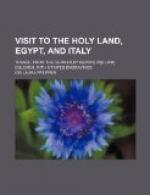Pompeii is without doubt the most remarkable city of its kind that exists. A great portion of the town is surrounded by walls, and entire rows of houses, several temples, the theatre, the forum, in short a vast number of buildings, streets, and squares lay open before us. The more I wandered through the streets and open places, the more I involuntarily wondered not to find the inhabitants and labourers employed in repairing the houses; I could hardly realise the idea that so many beautiful houses and well preserved apartments should be untenanted. The deserted aspect of this town had a very melancholy effect in my eyes.
Though a great portion of the town has already been dug out, only three hundred skeletons have been found,—a proof that the greater portion of the inhabitants effected their escape.
In many houses I found splendid tesselated pavements, representing flowers, wreaths, animals, and arabesques; even the halls and courtyards were decorated with a larger kind of mosaic work. The walls of the rooms are plastered over with a description of firm polished enamel, frequently looking like marble, and covered with beautiful frescoes. In Sallust’s house a whole row of wine jugs still stands in the cellar. In the houses the division of the rooms, and the purposes to which the different apartments were devoted, can still be distinctly traced. In general they are very small, and the windows seldom look out upon the street. Deep ruts of carriages can be seen in the streets. All the treasures of art which could be removed, such as statues, pictures, etc., were carried off to Naples, and placed in the museum there.
VESUVIUS.
In the agreeable society of Herr M. and Madame Brettschneider, I rode away from Resina at eleven in the forenoon. A pleasant road, winding among vineyards, brought us in an hour’s time to the neighbourhood of the great lava-field, Torre del Greco. It is a fearful sight to behold these grand mounds of lava towering in the most various forms around us. All traces of vegetation have vanished; far and wide we can descry nothing but hardened masses, which once rushed in molten streams down the mountain. A capitally-constructed road leads us, without the slightest fatigue, through the midst of this scene of devastation to the usual resting-place of travellers, the “Hermitage.”
At this dwelling we made halt, ascended to the upper story, and called for a bottle of Lacrimae Christi. The view here, and at several other points of our ascent, is most charming.
The hermit seems, however, to lead any thing but a solitary life, for a day seldom passes on which strangers do not call in to claim his attention in proportion as they run up a score. The clerical gentleman is, in fact, no more and no less than a very common innkeeper, and partakes of the goodly obesity frequently noticed among persons of his class. We stayed three quarters of an hour in the domicile of this




